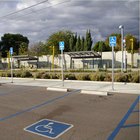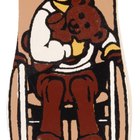
Qualifying for welfare assistance in Illinois is based upon your family income, the number of people in your household, whether you receive child support and your ability to work. There are three components to Illinois welfare assistance: cash, medical assistance and food stamps. If you don't qualify for cash, you may still be eligible for medical assistance and food stamps.
Temporary Aid to Needy Families (TANF)
To qualify for Temporary Aid to Needy Families (TANF), you must be pregnant or have a child under the age of 19 who lives with you. If your child is 18, he or she must still be a full-time high school student. If you are pregnant, you may qualify even if you don't have any other children. Your husband may also qualify if he lives with you. For consideration, living in Illinois is mandatory, and you are eligible even if you are homeless. You must be a U.S. citizen or meet specific immigration requirements which will be explained to you by a welfare worker; some information can be obtained only via an interview.
TANF offers temporary cash assistance to help your family with basic needs, such as food, rent and utilities. It also strives to help families become self-sufficient and so offers GED, basic English, vocational training, child care assistance and job resources.
If you qualify for Illinois TANF, you will get food and medical assistance, too.
Illinois Department of Human Services Springfield Office, 100 South Grand Ave., East Springfield, IL 62762. Call 217-557-1601 or 800-843-6154 (in English or Spanish) or go online at www.dhs.state.il.us.
Supplemental Nutrition Assistance Program (SNAP)
SNAP was once known for Illinois food stamps, and if you have a low income or need help buying food, you may apply. To qualify, a welfare worker must review your income and expenses; another factor is the number of people who live and eat together in your household.
There are guidelines concerning the amount of your gross income and SNAP eligibility. For example, guidelines at the end of 2017 state that if two people (under 60 and non-disabled) live in your household, and you gross more than $2,223 monthly, you may not qualify. But if you have child care expenses, you may qualify. This is why you have to be screened by a welfare worker; each situation is different.
If you are older than 60 or disabled, you are allowed more income than those who are younger or non-disabled. Guidelines at the end of 2017 state that for a household of two, you can have a gross monthly income of up to $2,707 and still be eligible.
Illinois Department of Human Services Springfield Office, 100 South Grand Ave. East, Springfield, IL 62762. Call 217-557-1601 or 800-843-6154 (in English or Spanish) or go online at www.dhs.state.il.us.
Medical Assistance (Medicaid)
If you meet financial criteria and are a U.S. citizen (in most cases), you may qualify for Illinois Medicaid. One of the following must also apply to you: You are blind, you are disabled, you are over age 65, you have children under the age of 19 or you are pregnant. Again, your income and living situation must be assessed by a welfare worker.
Children do not have to be U.S. citizens to qualify, and if you don't qualify, your children can still get medical coverage through the state's AllKids program.
Illinois Department of Human Services Springfield Office, 100 South Grand Ave. East, Springfield, IL 62762. Call 217-557-1601 or 800-843-6154 (in English and Spanish) or go online at www.dhs.state.il.us.
Related Articles

Income Limits for Food Stamps & ...

Illinois Requirements for the Medical ...

How to Get Emergency Cash Assistance

How to Obtain a Marriage License in ...

How to Become Emancipated in the State ...

How to Get Paid to Stay Home & Care for ...

Programs to Take Care of a Disabled ...

How Much Money Does a Refugee Get from ...

How to Get Senior Low Income Housing ...

Kentucky Federal Grants for Single Moms

How Much Are Monthly Disability ...

How to Get Paid to Care for Someone on ...

How to Get Paid to Care for a Relative

How to Cancel My Wealthy Affiliate ...

How to File for Legal Separation in ...

How to Get Married & Keep it Off Public ...
How to Get Green Card

How to Get Rental Assistance for Seniors

How to Apply for Welfare Benefits in ...

The Pros & Cons of Family Assistance
References
Writer Bio
Phyllis Smith Asinyanbi lives in Chicago and began writing professionally in 2009. Her work has appeared on eHow, Digital Journal and Allvoices. She won an Allvoices American Pundit Semi-Monthly prize for a report she wrote on the Boston bombing and was also featured as an Allvoices Anchor of the Week.
Photo Credits
tavolo image by giovanni cardinali from Fotolia.com